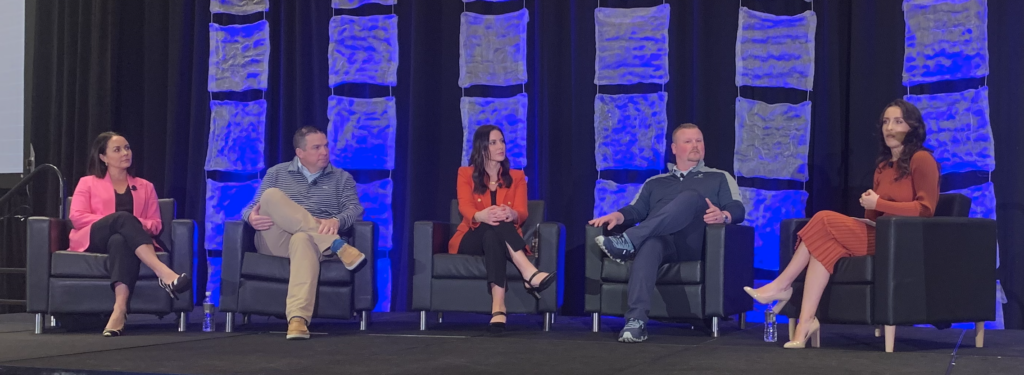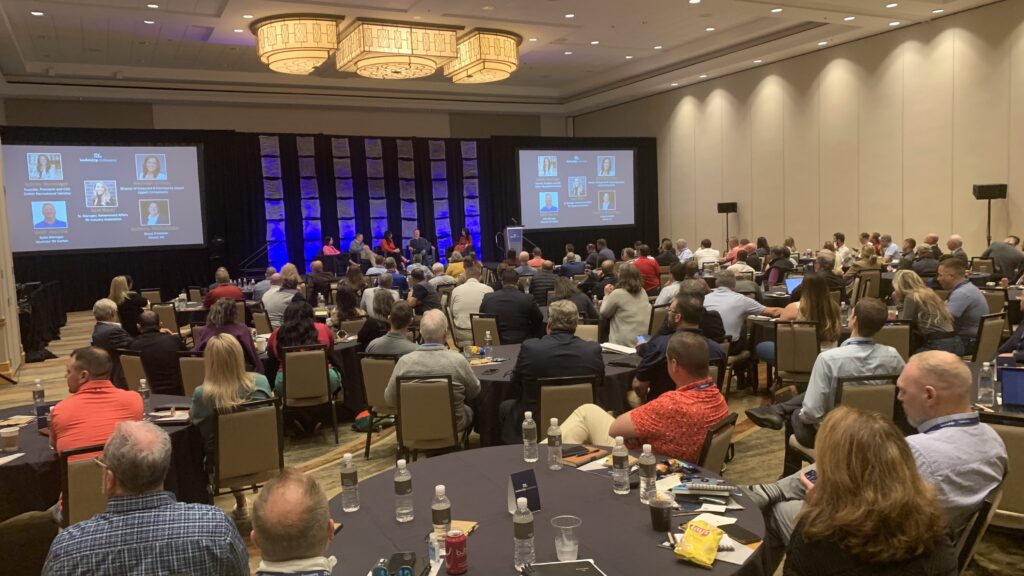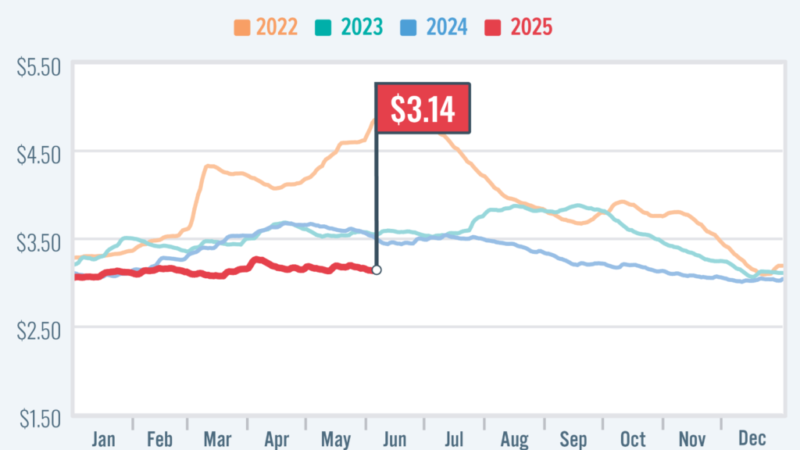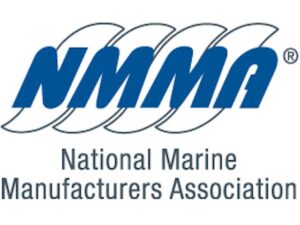RVIA Panelists Explore How to Cultivate Emerging Leaders

From left: Ashley Bontrager, Ember Recreational Vehicles president and CEO; Anthony Wollschlager, Airxcel group president; Michilah Grimes, Lippert director of corporate and community impact; Matt Veurink, Veurinks’ RV Center sales manager; and Samantha Rocci, RVIA senior manager of government affairs. (Photos: Rick Kessler/RVBusiness)
PHOENIX, Ariz. – Representing a cross-section of the RV industry, members of the Emerging Leaders Coalition (ELC) offered their unique perspectives Thursday (March 16) on ways they identify, support and nurture the future leaders of their companies.
The ELC panel served as the last seminar of a jam-packed day at the RV Industry Association (RVIA) Leadership Conference, which concludes after more seminars today (March 17) at the JW Marriott Phoenix Desert Ridge Resort & Spa.
Hosted by the ELC, a group of “next generation industry leaders” formed by the RVIA about a year ago, the conference features several leadership-focused seminars as well as networking, recreational and philanthropic activities.
Moderated by Samantha Rocci, RVIA senior manager of government affairs, the ELC panel featured Michilah Grimes, Lippert director of corporate and community impact; Matt Veurink, Veurinks’ RV Center sales manager; Anthony Wollschlager, Airxcel group president; and Ashley Bontrager, Ember Recreational Vehicles president and CEO.
What follows is an edited account of the ELC panel discussion.

In front of more than 180 people, the Emerging Leaders Panel discussed the strategies to identify and nurture the future leaders of their companies.
Rocci: How do you identify and motivate emerging leaders within your own companies and teams?
Grimes: I think leaders kind of put themselves in the front. At Lippert, it’s really where you try to identify them through what their passions are and how they get involved outside of their job and in the community, how they help one another in their role and then try to figure out what is their natural skill and how can we help support that.
Wollschlager: One thing that I look for in young leaders is the intangibles. Things that perhaps you can’t teach. I relate it back to sports where a lot of people can kick and throw and run, but what are some of those things that through discussion you learn what drives them. Once they are a part of our team, then it becomes our responsibility as leaders to understand how to challenge them. The younger generation of leaders, if they are hungry, they’re very self-motivated, which then forces us as employers to make sure we create that environment where they can flourish.
Bontrager: I think there’s a lot more to leadership than just being a standout in your role. I look for someone who’s hungry to look beyond just the tasks that need to get done. I try to find those people and I seek the people out that have a desire to inspire and develop others once they get into that leadership role.
Veurink: To identify your leaders, you need to identify who they are as people, not just as employees. So, I find it very important to invest in them as a person, maybe more than you invest in them as employees. What drives them? What motivates them? All of us have different motivations in this room. All of our employees have different motivations.
Rocci: How do you balance the need to innovate and experiment, but also remain true to your brand and the culture of your teams and your companies?
Veurink: It starts with surrounding yourself with people who fit your culture and your core values. So, when you have those new ideas, one, do they fit your core values and, two, do they get you to the finish line? Because it’s easy to always chase that shiny object, right? So, if you continue to stay on path for what you want your culture to be and where you want your company to go, it makes it a lot easier to develop those new ideas and then make sure that they fit where you’re trying to get to.
Grimes: I would ask the question: if your core values and your brand don’t promote innovation, then are they the right core values for the company? Because I think with any core value that is pushing team members to be the best that they can be and find what they’re passionate about, that innovation will naturally come out.
Wollschlager: I think innovation drives business, but it’s innovation not just from a products standpoint but how do we take innovation within all the different buckets of our business. One of our companies has an employee platform called Innovate or Die. Ultimately, we’re tapping into the greatest population of our employees by giving them a platform to provide feedback, work as a team in their different area of the business and then be rewarded for success. That has culturally done a lot of good things for that particular business and they live by that.
Bontrager: Ember was formed out of this idea that we could do things maybe a little bit differently, not only with the product but with the company. So, when we wrote our company core values and philosophies, one of the things on there was that we wanted to challenge the status quo every chance we could.
For me personally, once something is brought across my desk, I always look at it and I ask what area of our business is it going to affect? Does it keep the company as a place I want to work for? Does it keep the company a place that I would want to do business with? And does it keep the product or the company a place that I want to buy from?
Rocci: What do you think this industry can do better to attract emerging leaders into the industry, both from within but also from outside of the industry? And then, once they’re here, how can we keep them here and develop that talent?
Bontrager: People want to know that there’s a path forward, and a leader above them or the company is helping them develop that path and showing them the steps they need to take to get to the next level. There’s a lot of people out there who sometimes feel lost without the right guidance or without the right direction and development into the next phase. They’re going to get discouraged. We need to encourage that hunger and that growth and also set the path and help them get to where they want to go.
Wollschlager: I believe that our industry is still very much relationship driven. As a young person coming in, it takes time to build those relationships. There has to be a certain level of trust doing the right thing every time. And, with that, making sure they have patience to get there. It doesn’t happen overnight.
Grimes: I would say just to continue to diversify. We’ve done a great job of that over the last five, 10 years. Continue marketing and getting out into the schools and in the different communities. I know it’s sometimes hard to come into the RV space if you aren’t from the RV space, but I think it provides a lot of good challenging questions and it makes the RV industry better.
Veurink: I think conferences like this are important. Seeing three times the amount of people at this conference than what we had a year ago is awesome. It tells me that we’re doing things the right way. We’ve just got to continue on this path with the ELC and developing the future leaders of this industry.
Rocci: What are some of the challenges that emerging leaders face in this industry?
Veurink: We just have to remember that even if sales have dropped and times are a little bit tighter and tougher, it’s still a really great industry to be in. Obviously, I’m biased. I grew up in this industry; I don’t think there’s any better industry. We’re going to sell fun; we’re going to put RVs in people’s front yards and they’re going to experience the United States and Canada. It’s a really powerful and great industry. But we just have to remember what’s made us successful to this point and then continue on that path.
Wollschlager: This thing’s a marathon, right? And our industry has been cyclical for all its existence. The challenges that we had over the last three years are different than what we have right now, so I keep going back to the word “patience.” I think young leaders need to have patience and understand this industry from that stance. It’s critical that we are focused on the right things, we don’t let emotion drive decisions.
Bontrager: Right now, one of the worries I have is the uncertainty of what’s next. What’s right around the corner? It just has seemed a little bit crazier and more uncertain the last three years, which I think all of us in this room can agree with. But, if we all can not react with emotion and take a deep breath … as an industry we’ve been through some crazy times before, we’ll get through them again. But it takes all of us to do that.
Grimes: People have to be open to change. Last year, in October we figured out goals for this year. They’ve completely changed from where they were just in October. So, my advice to new leaders would just be you have to roll with the punches because there’s going to be the good times and there’s going to be hard times.
Rocci: What advice do you have for emerging leaders who want to develop their leadership skills in the industry, break into the industry, and build a reputation in the industry?
Grimes: I’m a little bit biased, and I would agree with what somebody said earlier, is to get involved whether that’s with the Emerging Leaders Coalition or through a different group like the RV Women’s Alliance. But it’s also just sitting on profit boards and getting out in your community and getting to know one another in a deeper level.
Bontrager: I agree with getting out and meeting people in the industry, but it’s also making yourself uncomfortable – get into new experiences – that’s the way we grow and the way we learn. Even if it doesn’t turn out the way that you had hoped, the next time you’re that much better because you’ve been through it. You’ve learned from it.
Wollschlager: I’m a firm believer that the feeling of anxiety is because there’s lack of action. Remember that if we make a bad decision, we can go ahead and make another decision. Don’t be fearful and do nothing. So, that’s my advice to folks who are entering the industry. It’s going to be difficult, that’s okay. You’re going to make bad decisions, that’s okay. Learn from it, and continue to move. Doing nothing is never good.
Veurink: Just be engaged and participate. If an opportunity like this or another opportunity comes down the road, take it.
Source: https://rvbusiness.com/rvia-panelists-explore-how-to-cultivate-emerging-leaders/






